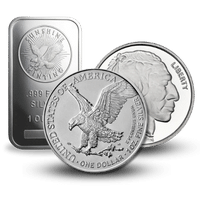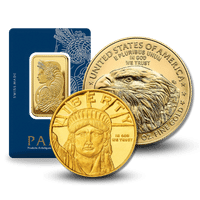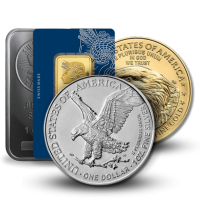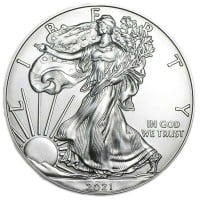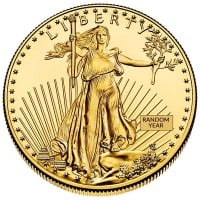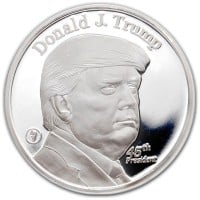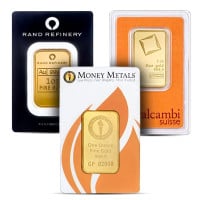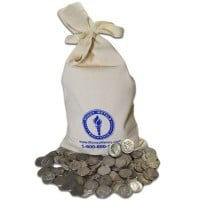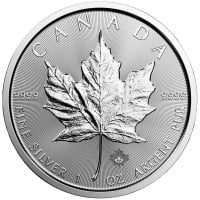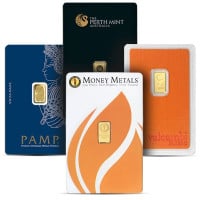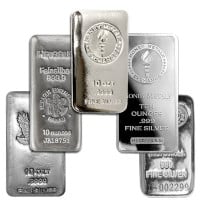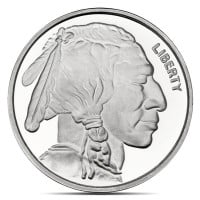Purchasing (or Selling) Gold and Silver in Alabama
Extremely competitive buy and sell pricing
White glove customer service
Most trusted, high integrity
Fast shipping and clearing times
Wide array of services
News and commentary on the markets

About Alabama
Admitted to the union in 1819, Alabama is home to about five million people. The 24th most populated state in the union and the 30th in area, Alabama is home to metropolitan hubs Montgomery and Birmingham and is nicknamed "The Yellowhammer State," after the state bird. Alabama has taken modest steps to cultivate an environment more conducive to sound money ownership and use, though no introduced measures have been passed.
What are the Laws on Gold & Silver in Alabama?
- Alabama State Sales Tax Laws
- Alabama Capital Gains Laws
- Alabama Gold and Silver Money Status
- Alabama Depository Laws
- Alabama State Reserves Laws
- Alabama Government Pension Funds
- Coin Shops in Alabama
Alabama State Sales Tax Laws?
Alabama has started the process of freeing gold and silver from bureaucratic shackles.
In 2022, Senator Tim Melson (R-Florence) introduced and worked to pass Senate Bill 13. SB 13 clarified that the exemption covers all common forms of bullion, removed burdensome reporting requirements, and extended the sales tax exemption until 2028. Gold, silver, platinum, and palladium coins, bars, and rounds are exempt from sales taxes in Alabama.
For more information on rolling back sales tax on constitutional money, click here.
Alabama Capital Gains Tax?
Alabama law, like most states, is chock full of draconian revenue statutes.
Under current law, gold and silver are subject to capital gains taxation when exchanged for Federal Reserve notes or when used in barter transactions.
Income taxes are one major way government bureaucrats penalize holders of precious metals. If you own gold to protect against the ongoing devaluation of America's paper currency (which results from the inflationary practices of the Federal Reserve), you may end up with a "gain" on your gold when it's priced in dollars. Not necessarily a real gain, mind you. It's frequently nothing more than a nominal gain -- but it's nonetheless considered income against which the government assesses a tax.
However, other state legislators across the country have started to recognize that paying taxes on nominal gains is beyond the pale. Arizona and Utah recently eliminated capital gains taxation on precious metals, and Idaho hopes to follow soon.
For more information on capital gains taxation of precious metals, click here.
Gold and Silver Recognized as Money in Alabama?
The United States Constitution states in Article I, Section 10, "No state shall...make anything Thing but gold and silver Coin a Tender in Payment of Debts."
Legislative acts that take steps towards this constitutional requirement are slowly gaining steam. Utah and Oklahoma are leaders in this field, declaring gold and silver as money within their states.
Unfortunately, Alabama has not taken any steps to reaffirm its constitutional duty to treat gold and silver coins as tender in payment of debt as Oklahoma and Utah did with the recent passage of SB 862 and HB 157, respectively.
Oklahoma’s SB 862 reads, in part, “gold and silver coins issued by the United States government are legal tender in the State of Oklahoma. No person may compel another person to tender or accept gold or silver coins that are issued by the United States government, except as agreed upon by contract.”
Utah’s HB 157 reads, in part, “except as expressly provided by contract, a person may not compel any other person to tender or accept legal tender.”
The phrase, “except as agreed upon by contract,” has significant ramifications. This wording reaffirms the court’s ability, and constitutional responsibility according to Article I, Section 10, to require specific performance when enforcing such contracts. If voluntary parties agree to be paid, or to pay, in gold and silver coin, the Oklahoma courts may not substitute any other thing, e.g. Federal Reserve Notes, as payment.
Gold clause contracts are a useful tool to give both creditors and borrowers alike protection against the currency risks resulting from both inflation and deflation.
For more information on gold clause contracts, click here.
Practically speaking, state laws that recognize gold and silver as money restore a government view of precious metals as the favored form of money – a currency rather than a piece of property or other asset. Using this logic, it would be inappropriate for a state to levy taxes when the precious metals are used or exchanged.
For more information, click here
Alabama Depository Laws?
Alabama law does not currently allow for a state bullion depository.
Texas is championing the state depository cause and other states will likely follow suit. In June of 2015, Texas Governor Greg Abbott signed House Bill 483 into law.
Authored by Representative Giovanni Capriglione (R-Southlake), this bill allows for "the establishment and administration of a state bullion depository."
According to the official Texas Depository website, House Bill 483 "allows for the nation's first state bullion depository to be established in Texas under the supervision of the state's comptroller's office."
Upon signing the bill, Governor Greg Abbott said "with the passage of this bill, the Texas Bullion Depository will become the first state-level facility of its kind in the nation, increasing the security and stability of our gold reserves and keeping taxpayer funds from leaving Texas to pay for fees to store gold in facilities outside our state."
Alabama Holding Reserves in Gold and Silver?
Financially prudent individuals set aside surplus funds to protect against unforeseen expenditures. This way, when faced with loss of income, house repairs, car trouble, or anything else, they will have a buffer against unanticipated downturns.
In the same vein, almost every state in the United States has established a “savings account” for government operations. Primarily to mitigate a decline in tax revenues that comes alongside economic slumps, states have created so-called budget stabilization funds – colloquially known as “rainy day funds.”
Unfortunately, like every other state in the union, Alabama does not hold any of its reserves in gold and silver.
While Alabama may not hold its reserves in gold and silver yet, Tennessee is setting an example by considering legislation that would allow for this. Tennessee Representative Bud Hulsey introduced House Bill 0777 in 2017 which "requires the state treasurer to invest 40 percent of the funds in the rainy day fund in gold bullion of other precious metal bullion." This bill will be voted on in 2018.
For more information on Budget Stabilization Funds, click here.
Is Alabama Holding Physical Gold & Silver in Government Pension Funds?
Millions of Americans will rely on pensions once they've reached the age of retirement. Pension fund managers have a fiduciary duty to safeguard funds against foreseeable risks.
With the practices of today's Federal Reserve, there is no risk more foreseeable than inflation! But with very few exceptions, pension money managers are not fulfilling their duty to protect against this significant risk by investing in assets that are specifically suited to defend against the perpetual decline of the dollar's purchasing power. Chief among these assets are physical gold and silver, the most reliable inflation hedges from time immemorial.
Tens of millions of Americans and their employers pour money into pension plans each month, counting on those funds to grow and be there when needed at retirement.
But a time bomb awaits. The bulk of U.S. pension funds are dangerously underfunded, and the assets are often invested in securities that have bleak prospects for providing income that keeps up with a general decline in purchasing power. In the case of underfunded government pensions, higher taxes invariably follow combined with potential default on obligations to retired workers.
Unfortunately, Alabama's government pension funds do not appear to hold ANY assets in physical gold and silver.
Texas gives states an example to emulate. The Texas Teacher Retirement Fund and the University of Texas own nearly $1 billion in physical gold. As a non-correlated asset to bonds, stocks, and other paper-based investments, precious metals are key to true diversification.
For more information on pension funds, click here.
Find the best place to buy gold bars online or from your local coin shop, along with other 1 ounce silver coins:
Local Coin Shops in Alabama
Featured Coin Shops
The following are dealers in Alabama. DISCLAIMER: Money Metals Exchange does not vet or endorse any other dealers, so if you decide to patronize any of the following establishments, be sure to do your own due diligence.
Coastal Gold & Silver - University Mall
1701 McFarland Blvd E
Tuscaloosa, AL 35404
Gold & Silver Exchange
4491 US-431
Albertville, AL 35950
Alabama Coin & Silver Co
900 Bob Wallace Ave SW #122
Huntsville, AL 35801
The information provided on this website does not, and is not intended to, constitute legal advice; instead, all information, content, and materials available on this site are for general informational purposes only. Information on this website may not constitute the most up-to-date legal or other information. This website contains links to other third-party websites. Such links are only for the convenience of the reader, user or browser; Money Metals does not recommend or endorse the contents of the third-party sites. Readers of this website should contact their attorney to obtain advice with respect to any particular legal matter. No reader, user, or browser of this site should act or refrain from acting on the basis of information on this site without first seeking legal advice from counsel in the relevant jurisdiction. Only your individual attorney can provide assurances that the information contained herein – and your interpretation of it – is applicable or appropriate to your particular situation. All liability with respect to actions taken or not taken based on the contents of this site are hereby expressly disclaimed. The content on this posting is provided "as is;" no representations are made that the content is error-free.




